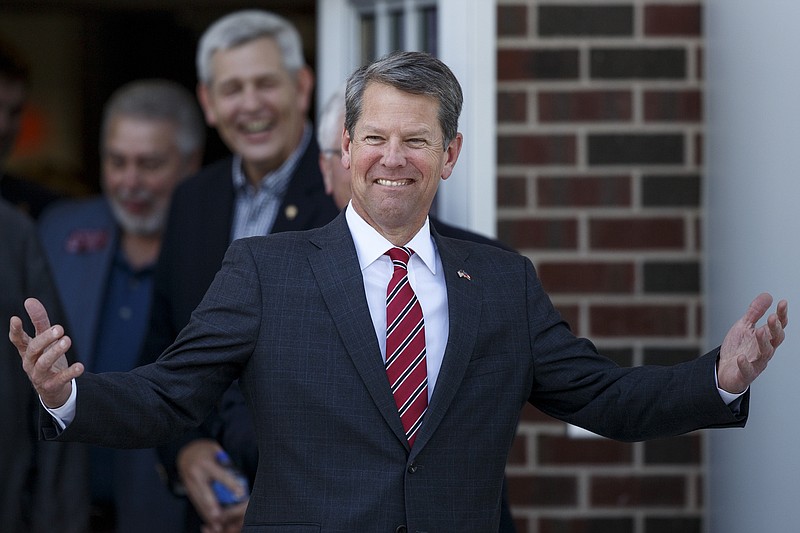It's the fight for which both sides have been spoiling. And it may play out in grand scale as an undercard to the 2020 presidential election.
The United State Supreme Court, in finding in the 1973 Roe v. Wade decision that women have a fundamental right to an abortion, failed to ultimately wrangle with the viability of a fetus.
As such, the pro-choice and and pro-life sides are still wrangling today.
What has changed in the near term is the appointment of what pro-life supporters believe is a conservative Supreme Court majority that could overturn Roe v. Wade.
Because of that assumed majority, several states have become bolder in what the original abortion decision said is the state's interest in the life of the fetus corresponding to its increasing "viability" over the course of the pregnancy.
Georgia, for instance, recently passed and Republican Gov. Brian Kemp signed a bill that would ban abortions once a fetal heartbeat is detected, which could be as early as six weeks into the pregnancy.
In 1973, in Roe v. Wade, the high court placed the state's interest in viability at a "trimester" (about 12 weeks). But in 1992 in Planned Parenthood v. Casey, with the advent of better medical technology, the Court abandoned the "trimester" reference and ruled women have a right to choose an abortion before viability.
The question, then, is when is viability? The youngest premature baby in the world to survive was born at 21 weeks, four days, in 2014.
And as the age of viability gets younger, the question of when life begins takes on new meaning.
For those on the pro-choice side, some have had to admit the blob of protoplasm they're referring to is a child. When Alabama state Rep. John Rogers recently uttered, "Some kids are unwanted, so you kill them [with abortion] now or you kill them later," he was admitting as much.
But some have stubbornly stuck to their rhetoric. Christine Quinn, a former speaker of the New York City Council, took such a stance earlier this week on a CNN program.
"When a women gets pregnant," she said, "that is not a human being inside of her. It is part of her body, and this is about a woman having full agency and control of her body and making decisions about her body and what is her body with medical professionals."
On the opposite end of the spectrum from Georgia, the state of New York earlier this year passed legislation to allow abortions through 24 weeks of pregnancy - "or at any time when necessary to protect a woman's life or health."
The "at any time" phrase has outraged many pro-life supporters because they're aware the vagueness of the wording will allow many fetuses to be aborted up to full term in the name of women's "health."
It's also not the choice of many Democrats. Only 18% in a 2018 Gallup poll said they support a third-trimester abortion, and a majority said they don't support one in the second trimester.
Georgia became the fourth state, following Kentucky, Mississippi and Ohio, to pass a "heartbeat" bill. Tennessee tabled such a bill during its recently completed legislative session. Instead, legislators passed a measure that "triggers" an abortion ban if the Supreme Court overturned or changed Roe v. Wade.
Kentucky's bill has been blocked by a state judge, and a federal judge will hear a challenge to Mississippi's law later this month. The chief counsel at the Center for Reproductive Rights said that organization will be suing Georgia to block the bill.
Kemp, meanwhile, vowed to stay the course.
"Our job is to do what is right, not what is easy," he said. "We are called to be strong and courageous, and we will not back down."
Pro-life supporters are in the position to hope the laws will be blocked until they get to the Supreme Court. Then their desire is that a conservative majority will overturn Roe v. Wade and perhaps even make a ruling about the question of when life begins.
A more likely result, should the law be overturned, is that abortion would be returned to the states, which would individually decide how to handle it.
Between now and the hypothetical then is the 2020 election. Many of the 20-plus Democratic candidates say they won't be pinned down on exactly when in pregnancy a woman ought to be able to obtain an elective abortion, meaning they may believe fetuses are somewhere between "part of her body" and a life itself.
They're certain to be asked about it, though.
U.S. Sen. Kirsten Gillibrand, a 2020 presidential candidate, already has put a marker down, though.
She said earlier this week in a blog post announcing her campaign platform that, as president, she would "only nominate judges - including Supreme Court justices - who will commit to upholding Roe v. Wade as settled law and protect women's productive rights."
With the "heartbeat" bills working their way through the courts, 2020 voters should press candidates on the subjects of viability of a fetus and when life begins. Their answers will reveal not only a lot about a heartbeat but also about their heart.
